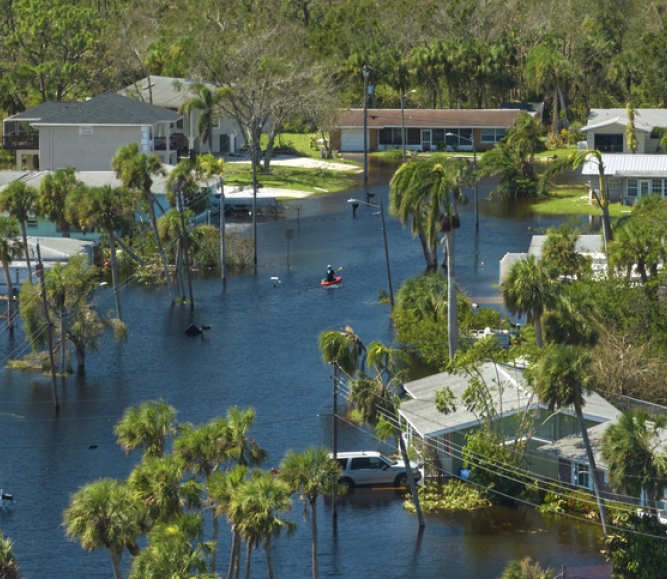Reauthorize the National Flood Insurance Program

Action Needed
Urge your members of Congress to support legislation that will reauthorize the National Flood Insurance Program (NFIP) and ensure the program is accessible and affordable for all county residents. Current authorization ends on September 30, 2024.
Background
The NFIP was created by Congress under the National Flood Insurance Act of 1968 (P.L. 90- 448) to provide insurance coverage to property owners for damages and losses due to catastrophic flooding.
Today, the NFIP is administered by the U.S. Department of Homeland Security (DHS) through the Federal Emergency Management Agency (FEMA). The program aims to reduce the impact of flooding on private and public structures by providing affordable insurance to property owners, and by encouraging communities to adopt and enforce floodplain management regulations.
The NFIP was last reauthorized in 2012 when President Obama signed the Biggert-Waters Flood Insurance Reform Act of 2012 (P.L. 112-141). The NFIP’s five-year reauthorization ended on September 30, 2017, and since then, the program has been funded by a series of short-term measures. The program is currently operating under an extension that will expire on September 30, 2024.
The purpose of the 2012 Biggert-Waters Act was to make the NFIP solvent, as the program faced a $20 billion deficit. However, the law resulted in some unintended consequences for local governments, residents and businesses: multiple counties, both coastal and inland, reported that homeowners and businesses experienced dramatic increases in annual NFIP flood insurance premiums due to phase-outs of subsidized premium rates. Additionally, due to a provision contained in the Biggert-Waters Act, FEMA began to update Flood Insurance Rate Maps (FIRMs), which included new low-lying areas that also began to face drastic rate increases.
In 2014, with NACo’s support, Congress passed the Homeowner Flood Insurance Affordability Act (P.L. 113- 89), which included several key reforms to the Biggert-Waters Act favorable to counties, including grandfathering of premiums for properties built to code prior to the release of the updated Flood Insurance Rate Maps (FIRMs); retroactive refunds to NFIP policyholders if they paid a higher premium under Biggert-Waters; and the removal of a sales trigger that fully actualized premium rates at the point of sale for properties that were added to new flood zones.
NACo supports the National Flood Insurance Program Reauthorization (NFIP-RE) Act of 2023 (S.2141/H.R. 4349) which would cap annual premium increases, incorporate affordability provisions for low- and middle-income policyholders, increase investments in flood mitigation and heighten transparency on FEMA’s new risk rating system.
Key Talking Points
- Congress should enact a long-term reauthorization of the NFIP. When the federal government uses short-term funding extensions, counties are often unable to effectively plan and implement a workable budget. The NFIP is currently operating under an extension that will expire on September 30, 2024.
- Congress should pass the National Flood Insurance Program Reauthorization (NFIP-RE) Act of 2023 (S.2141/H.R. 4349) which would provide five years of continuous operation and greater stability for policyholders through capped annual premium increases, incorporated affordability provisions, increased investments in flood mitigation and heightened risk rating system transparency.
Advocacy
Bipartisan, bicameral legislation introduced to reauthorize and reform the National Flood Insurance Program


Six years of the SUPPORT Act: Ongoing behavioral health policy priorities for counties
On October 24, 2018, the bipartisan SUPPORT Act was enacted. It represented the largest Congressional investment in overdose prevention at the time, aiming to strengthen the nation's response to the substance use crisis.

Report released on 1115 waiver implementation in California
In January 2023, California became the first state to receive federal approval for a Medicaid Section 1115 demonstration waiver to partially amend the Medicaid Inmate Exclusion Policy.

Utah Association of Counties takes on health benefits for EMTs
A program championed and managed by the state association will help rural counties attract and retain crucial volunteers for emergency responders.
